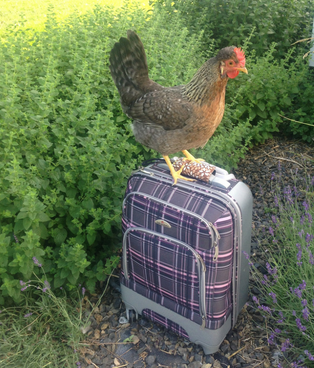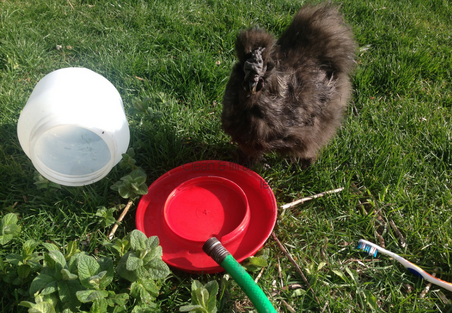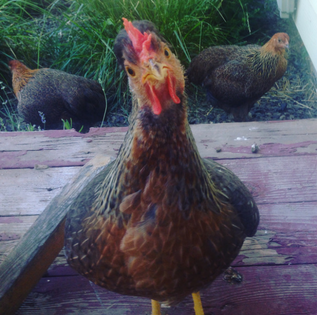How to Prepare your Flock for a Pet Sitter
by Kaylee Vaughn
Planning a vacation can be stressful and overwhelming when it means leaving your chickens behind! I am guilty of being the crazy chicken lady who doesn’t want to leave her flock in anyone else’s care. My significant other and I have even taken separate vacations so that one of us can stay with the animals! However, since there aren’t many chicken-friendly vacation destinations (crazy, right?), there’s a good chance that most of us will need to leave our flocks with a pet sitter at some point.
In college, I worked as a pet sitter while I hustled my way through vet tech school. I watched over an array of animals including livestock, exotic parrots, and animals with special medical needs. I met some wonderful people and animals through these experiences. Best of all, it helped prepare me for leaving my own chickens and animals with a pet sitter!
As a former pet sitter and current chicken mom, I can whole-heartedly say that we, as chicken owners, are a big determinant in our pet sitter’s success! Here’s how you can set your pet sitter up for success so that your chickens stay happy and healthy while you enjoy your vacation!

Since you can’t take chickens on vacation, follow these tips to ensure they have a great time with their pet sitter!
Ease into it
If you aren’t comfortable leaving your chickens with a sitter yet, consider doing a trial run. The ideal time to do this would be a month or two before your actual vacation. Spend a day or two away while the sitter watches over your animals and home. This will help build trust with your sitter and allow them to get acquainted with your flock. The sitter may think of additional questions to ask upon your return, which will help them prepare for future sittings. You will also be able to see if the sitter has the qualities you want. If not, you can part ways and continue your search for a new sitter. If the sitter proves to be a good match for you and your animals however, you will be able to enjoy your vacation knowing that they are already comfortable with your property and your chickens.
Choose a low maintenance time of year
Not all trips can be planned because life and emergencies do happen. However, if it is within your power to plan when your trip occurs, try to pick a low maintenance time of year. An incubator full of eggs due to hatch, a stubborn broody hen, or a brooder full of day-old chicks adds extra complications for a sitter! When planning your trip, also consider the expected temperatures. Caring for animals in extreme weather often requires additional duties and skills.
Over-communicate
Think about your property and your animals from the perspective of a stranger. Consider what the sitter will need to know in order for everything to run smoothly, even if things don’t go as planned. Show them where the breaker box is. Teach them them how to turn on and off the electric fence. Show them how to to properly secure the feed to prevent mice. In addition to showing them the ins and outs of the property, write it all down in case they need to reference it later. You may feel like you are over communicating, but that’s okay! During my very first pet sitting experience in junior high, I agreed to care for a fellow 4-H member’s sheep. On my first visit to her house, I was greeted by the terrible sight of one of her market lambs, dead in the field. I desperately tried to call the owners with no success. When I finally reached them a day later, I learned that the lamb had died shortly before they left town but they thought I wouldn’t notice it in the field! Needless to say, I would have preferred over-communication in this situation!

Clean the coop & fill all food and water dishes to make things easier for the pet sitter
Make it easy
Do as many chores as you possibly can before you leave. Clean the coop, fill the feeders, and check the fences. You may even want to install an automatic coop door! And don’t forget to tackle those repair projects! While that zip-tied coop latch may have worked fine for you over the last few years, it will be much easier for your sitter if you just replace the broken latch! Try to think of the simple things that may be overlooked, such as making sure that the sitter is able to lock and unlock your home or barn easily. Doors and locks vary greatly, and can be problematic from time to time! I’ve found that it’s often the simplest things that caused the most stress when I was pet sitting!
Prepare for an emergency
As much as we don’t want to think it will happen, there is always a possibility that an emergency could occur. Discuss with your pet sitter about how you would like them to handle an emergency if one does arise. Stock your first aid kit, and explain to the sitter where it is and how to use the items in it. If possible, leave the contact information for a knowledgeable friend or neighbor that the sitter can call. Before you leave, call your vet office and let them know that you will have a pet sitter watching your animals. Many vet offices will require you to pre-authorize the pet sitter on your account in order for them to perform treatment without your presence.
Check in, but don’t overdo it
Periodically, check in with your sitter if you are able to. This will give the sitter a chance to ask any questions that may have come up. It will also help give you peace of mind that your flock is doing well! While checking in is important, allow yourself to enjoy the time away! It can be hard leaving your chickens for the first time (or the hundredth time!), but you deserve time to relax and experience life!

A good pet sitter can help you enjoy vacation without feeling guilty about leaving your flock












